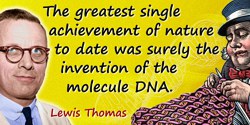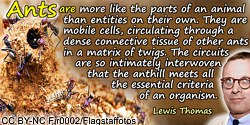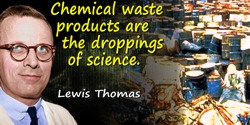 (source)
(source)
|
Lewis Thomas
(25 Nov 1913 - 3 Dec 1993)
American physician and author best known for his reflective essays on a wide range of topics in biology.
|
Lewis Thomas Quotes on Science (13 quotes)
>> Click for 61 Science Quotes by Lewis Thomas
>> Click for Lewis Thomas Quotes on | Ant | DNA | Error | Gene | Knowledge | Language | Learning | Life | Mind | Nature | New | Species | Truth | Universe |
>> Click for 61 Science Quotes by Lewis Thomas
>> Click for Lewis Thomas Quotes on | Ant | DNA | Error | Gene | Knowledge | Language | Learning | Life | Mind | Nature | New | Species | Truth | Universe |
A poet is, after all, a sort of scientist, but engaged in a qualitative science in which nothing is measurable. He lives with data that cannot be numbered, and his experiments can be done only once. The information in a poem is, by definition, not reproducible. ... He becomes an equivalent of scientist, in the act of examining and sorting the things popping in [to his head], finding the marks of remote similarity, points of distant relationship, tiny irregularities that indicate that this one is really the same as that one over there only more important. Gauging the fit, he can meticulously place pieces of the universe together, in geometric configurations that are as beautiful and balanced as crystals.
— Lewis Thomas
In The Medusa and the Snail: More Notes of a Biology Watcher (1974, 1995), 107.
Chemical waste products are the droppings of science.
— Lewis Thomas
In 'On Science and Certainty', Discover Magazine (Oct 1980).
Good applied science in medicine, as in physics, requires a high degree of certainty about the basic facts at hand, and especially about their meaning, and we have not yet reached this point for most of medicine.
— Lewis Thomas
The Medusa and the Snail (1979), 143.
Inexact method of observation, as I believe, is one flaw in clinical pathology to-day. Prematurity of conclusion is another, and in part follows from the first; but in chief part an unusual craving and veneration for hypothesis, which besets the minds of most medical men, is responsible. Except in those sciences which deal with the intangible or with events of long past ages, no treatises are to be found in which hypothesis figures as it does in medical writings. The purity of a science is to be judged by the paucity of its recorded hypotheses. Hypothesis has its right place, it forms a working basis; but it is an acknowledged makeshift, and, at the best, of purpose unaccomplished. Hypothesis is the heart which no man with right purpose wears willingly upon his sleeve. He who vaunts his lady love, ere yet she is won, is apt to display himself as frivolous or his lady a wanton.
— Lewis Thomas
The Mechanism and Graphic Registration of the Heart Beat (1920), vii.
It is the very strangeness of nature that makes science engrossing. That ought to be at the center of science teaching. There are more than seven-times-seven types of ambiguity in science, awaiting analysis. The poetry of Wallace Stevens is crystal-clear alongside the genetic code.
— Lewis Thomas
In Late Night Thoughts on Listening to Mahler's Ninth Symphony(1984), 209.
It is when physicians are bogged down … when they lack a clear understanding of disease mechanisms, that the deficiencies of the health-care system are most conspicuous. If I were a policy-maker, interested in saving money for health care over the long haul, I would regard it as an act of high prudence to give high priority to a lot more basic research in biologic science.
— Lewis Thomas
In 'The Technology of Medicine', The Lives of a Cell: Notes of a Biology Watcher (1974), 41-42.
Science is founded on uncertainty. Each time we learn something new and surprising, the astonishment comes with the realization that we were wrong before.
— Lewis Thomas
In 'On Science and Certainty', Discover Magazine (Oct 1980), 58.
The body of science is not, as it is sometimes thought, a huge coherent mass of facts, neatly arranged in sequence, each one attached to the next by a logical string. In truth, whenever we discover a new fact it involves the elimination of old ones. We are always, as it turns out, fundamentally in error.
— Lewis Thomas
In 'On Science and Certainty', Discover Magazine (Oct 1980)
The central task of science is to arrive, stage by stage, at a clearer comprehension of nature, but this does not mean, as it is sometimes claimed to mean, a search for mastery over nature.
— Lewis Thomas
In Late Night Thoughts on Listening to Mahler's Ninth Symphony(1984), 153.
The cloning of humans is on most of the lists of things to worry about from Science, along with behaviour control, genetic engineering, transplanted heads, computer poetry and the unrestrained growth of plastic flowers.
— Lewis Thomas
In The Medusa and the Snail: More Notes of a Biology Watcher (1979), 51.
The greatest achievements in the science of this [twentieth] century are themselves the sources of more puzzlement than human beings have ever experienced. Indeed, it is likely that the twentieth century will be looked back at as the time when science provided the first close glimpse of the profundity of human ignorance. We have not reached solutions; we have only begun to discover how to ask questions.
— Lewis Thomas
In 'On Science and Certainty', Discover Magazine (Oct 1980).
The only solid piece of scientific truth about which I feel totally confident is that we are profoundly ignorant about nature. ... It is this sudden confrontation with the depth and scope of ignorance that represents the most significant contribution of twentieth-century science to the human intellect.
— Lewis Thomas
In Medusa and the Snail: More Notes of a Biology Watcher (1974, 1979), 58.
This is the element that distinguishes applied science from basic. Surprise is what makes the difference. When you are organized to apply knowledge, set up targets, produce a usable product, you require a high degree of certainty from the outset. All the facts on which you base protocols must be reasonably hard facts with unambiguous meaning. The challenge is to plan the work and organize the workers so that it will come out precisely as predicted. For this, you need centralized authority, elaborately detailed time schedules, and some sort of reward system based on speed and perfection. But most of all you need the intelligible basic facts to begin with, and these must come from basic research. There is no other source. In basic research, everything is just the opposite. What you need at the outset is a high degree of uncertainty; otherwise it isn’t likely to be an important problem. You start with an incomplete roster of facts, characterized by their ambiguity; often the problem consists of discovering the connections between unrelated pieces of information. You must plan experiments on the basis of probability, even bare possibility, rather than certainty.
— Lewis Thomas
The Planning of Science, The Lives of a Cell: Notes of a Biology Watcher, (1974) .
See also:
- 25 Nov - short biography, births, deaths and events on date of Thomas's birth.
- The Lives of a Cell: Notes of a Biology Watcher, by Lewis Thomas. - book suggestion.
- Booklist for Lewis Thomas.




 In science it often happens that scientists say, 'You know that's a really good argument; my position is mistaken,' and then they would actually change their minds and you never hear that old view from them again. They really do it. It doesn't happen as often as it should, because scientists are human and change is sometimes painful. But it happens every day. I cannot recall the last time something like that happened in politics or religion.
(1987) --
In science it often happens that scientists say, 'You know that's a really good argument; my position is mistaken,' and then they would actually change their minds and you never hear that old view from them again. They really do it. It doesn't happen as often as it should, because scientists are human and change is sometimes painful. But it happens every day. I cannot recall the last time something like that happened in politics or religion.
(1987) -- 


